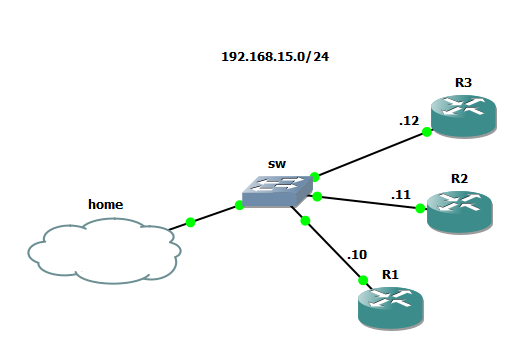A follow-up on the latest post about Netmiko where we logged in to our devices and did some show commands, let’s continue and do a very common thing in production networks with many devices - pushing out new config from a template.
I’ll be using our latest login_simple.py from last post as a base and just modify it slightly. First we create our config-file that we want in all our devices., let’s say we want to rollout a new route-map in our network.
config_template.txt
1
2
3
4
5
6
7
8
ip prefix-list DEFAULT-ROUTE seq 5 permit 0.0.0.0/0
!
route-map DEFAULT-INJECT permit 10
match ip address prefix-list DEFAULT-ROUTE
set extcommunity rt 300:301
!
route-map DEFAULT-INJECT permit 20
set extcommunity rt 300:300
In netmiko we can then use “send_config_from_file” when we’ve logged in to our device(s), super simple! Notice that we don’t have to manage the context in our router (enable/conf t etc), netmiko does it for us.
conf_from_file.py
1
2
3
4
5
6
7
8
9
10
11
12
13
14
15
16
17
18
19
20
21
22
23
24
25
26
27
28
29
30
31
32
33
34
from netmiko import ConnectHandler
from datetime import datetime
from getpass import getpass
DEVICES = ["192.168.15.10", "192.168.15.11", "192.168.15.12"]
USERNAME = "joco02"
PASSWORD = getpass()
FILE = 'config_template.txt'
def config_commands(devices, file):
for device in devices:
start_time = datetime.now()
connection = ConnectHandler(
device_type="cisco_ios", host=device,
username=USERNAME, password=PASSWORD)
hostname = connection.find_prompt()
device_result = ["{0} {1} {0}".format("=" * 20, hostname)]
command_result = connection.send_config_from_file(FILE)
device_result.append(command_result)
device_result_string = "nn".join(device_result)
connection.disconnect()
device_result_string += "nElapsed time: " + str(datetime.now() - start_time)
yield device_result_string
def main():
results = config_commands(DEVICES, FILE)
for result in results:
print(result)
if __name__ == "__main__":
main()
Results:
1
2
3
4
5
6
7
8
9
10
11
12
13
14
15
16
17
18
19
20
21
22
23
24
25
26
27
28
29
30
31
32
33
34
35
36
37
38
39
40
41
42
43
44
45
46
47
$ python conf_from_file.py
Password:
==================== R1# ====================
config term
Enter configuration commands, one per line. End with CNTL/Z.
R1(config)#ip prefix-list DEFAULT-ROUTE seq 5 permit 0.0.0.0/0
R1(config)#!
R1(config)#route-map DEFAULT-INJECT permit 10
R1(config-route-map)# match ip address prefix-list DEFAULT-ROUTE
R1(config-route-map)# set extcommunity rt 300:301
R1(config-route-map)#!
R1(config-route-map)#route-map DEFAULT-INJECT permit 20
R1(config-route-map)# set extcommunity rt 300:300
R1(config-route-map)#end
R1#
Elapsed time: 0:00:08.875642
==================== R2# ====================
config term
Enter configuration commands, one per line. End with CNTL/Z.
R2(config)#ip prefix-list DEFAULT-ROUTE seq 5 permit 0.0.0.0/0
R2(config)#!
R2(config)#route-map DEFAULT-INJECT permit 10
R2(config-route-map)# match ip address prefix-list DEFAULT-ROUTE
R2(config-route-map)# set extcommunity rt 300:301
R2(config-route-map)#!
R2(config-route-map)#route-map DEFAULT-INJECT permit 20
R2(config-route-map)# set extcommunity rt 300:300
R2(config-route-map)#end
R2#
Elapsed time: 0:00:08.799664
==================== R3# ====================
config term
Enter configuration commands, one per line. End with CNTL/Z.
R3(config)#ip prefix-list DEFAULT-ROUTE seq 5 permit 0.0.0.0/0
R3(config)#!
R3(config)#route-map DEFAULT-INJECT permit 10
R3(config-route-map)# match ip address prefix-list DEFAULT-ROUTE
R3(config-route-map)# set extcommunity rt 300:301
R3(config-route-map)#!
R3(config-route-map)#route-map DEFAULT-INJECT permit 20
R3(config-route-map)# set extcommunity rt 300:300
R3(config-route-map)#end
R3#
Elapsed time: 0:00:09.067742
We can now easily just change the config in our template and run the script again when it’s time for another rollout.

